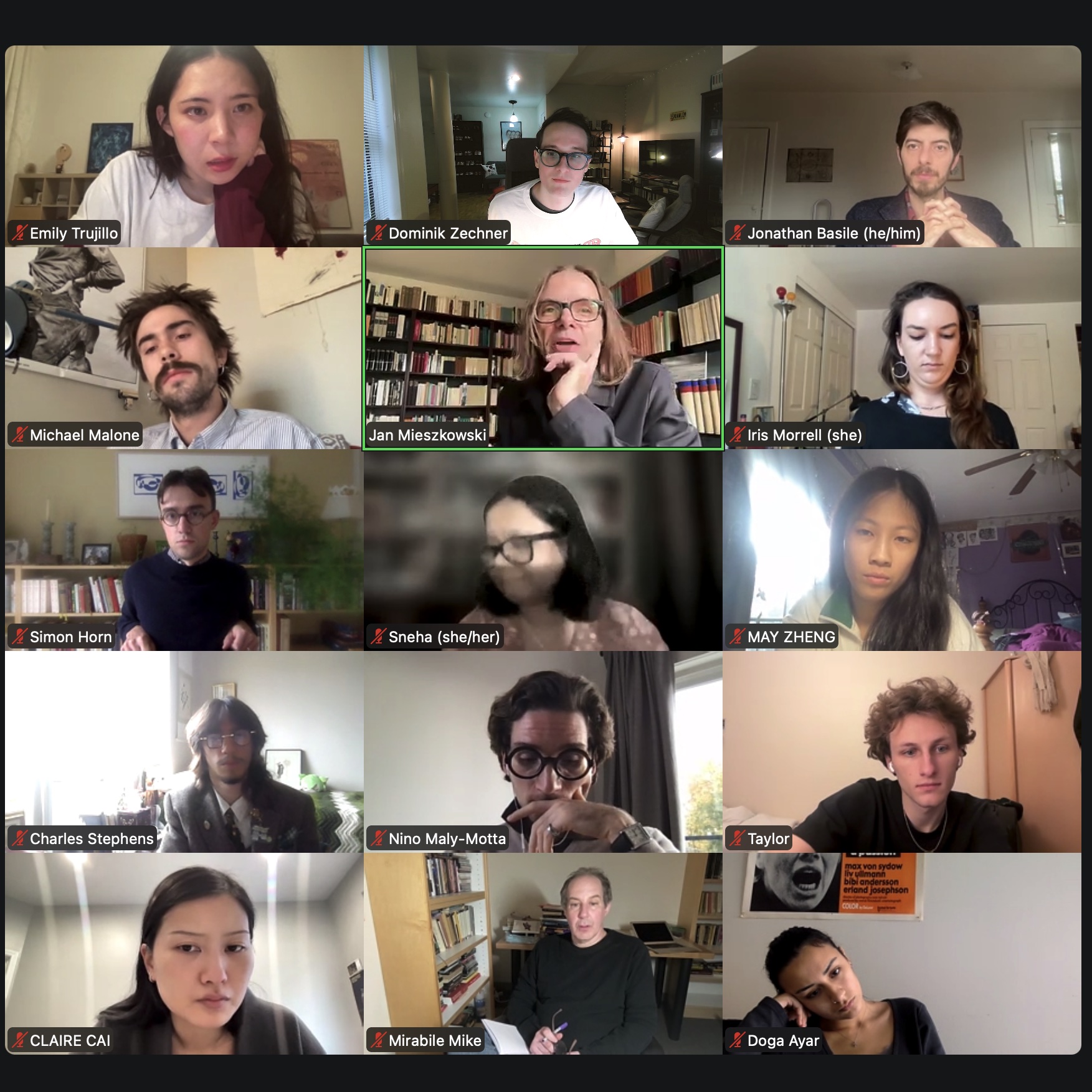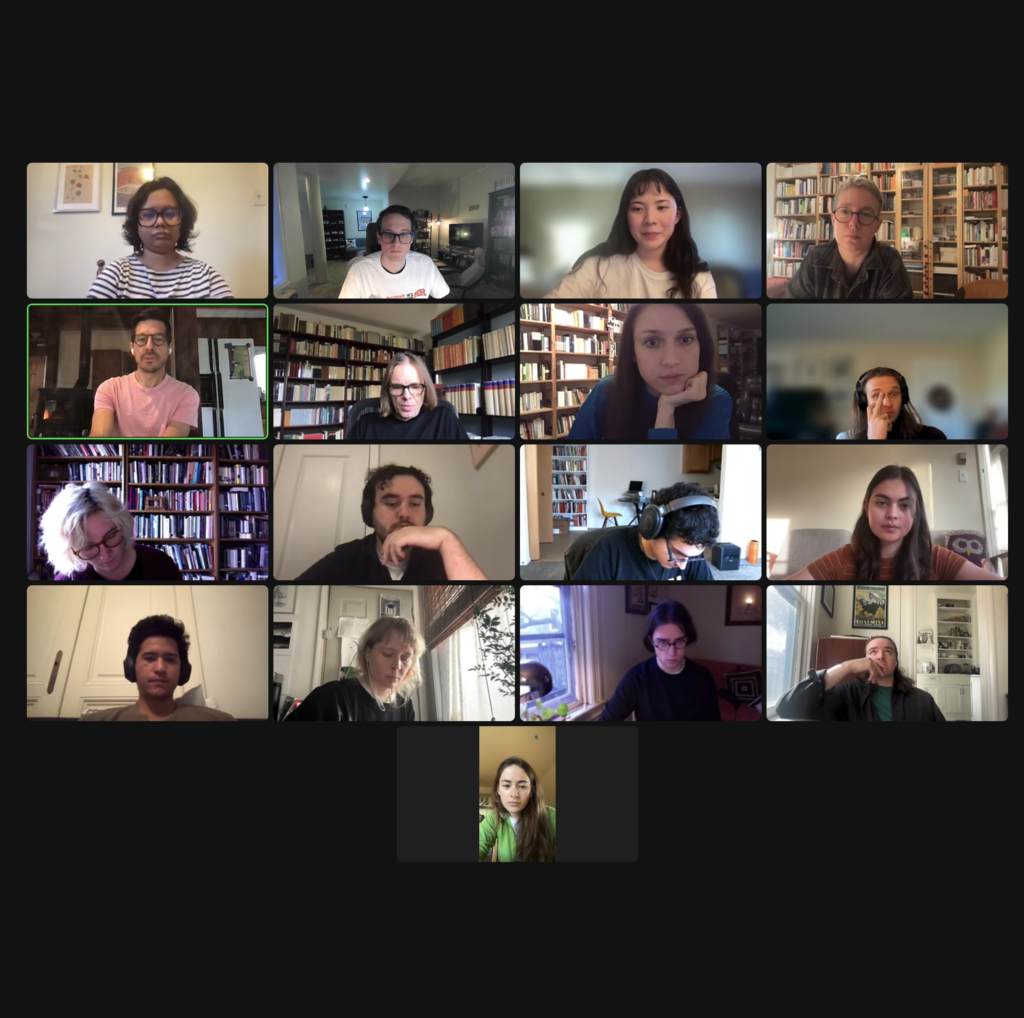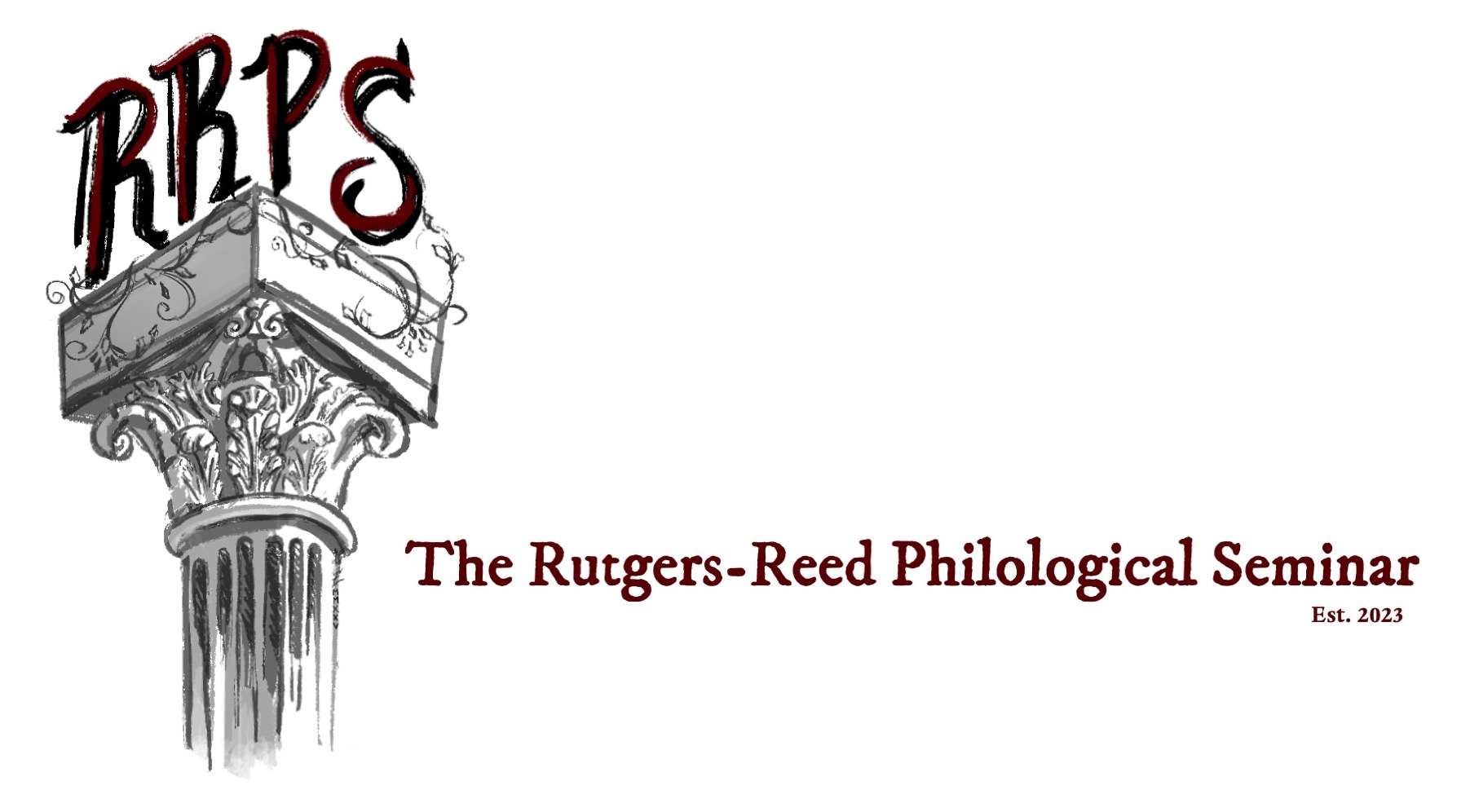Philological Seminar
*
Established in 2023, the Rutgers-Reed Philological Seminar (RRPS) is a collaborative venture between the German departments at Rutgers University and Reed College. The Seminar’s biannual meetings take the form of one-day online colloquia. At the forefront of our deliberations are the linguistic dynamics that are the condition of possibility and impossibility of our collective existence. Rather than organizing our discussions around particular concepts or themes, we select an idiomatic expression to serve as a jumping-off point for each gathering, although how participants choose to situate their interventions vis-à-vis this verbal signpost is entirely up to them. A laboratory for emergent ideas, the RRPS offers scholars of all ranks, from undergraduates to senior faculty, the opportunity to present works-in-progress. Uncertified, unossified, and unapologetically bi-coastal, we work to foster an open discourse unencumbered by stultifying hierarchies and conventions.
For questions about the RRPS, please reach out to Dominik Zechner and Jan Mieszkowski.
RRPS6: “Mum’s the Word” on April 17, 2026
Commissive and directive, mum’s the word may be a promise to withhold something (“I won’t tell”) or a request for discretion (“Please don’t tell”). Its performance defies simple locutionary categorization, in part because it is typically articulated as a retroactive seal, after a key piece of information has already been revealed. At once archaic in form and familiar in use, mum’s the word offers mutually beneficial discretion, implying that we would do well to work together and keep something off the record until the time is right. In this respect, the utterance aims less to suppress speech than to endorse an epistemology of the secret that delays discursive disclosure, as if the word could be temporarily cocooned (eingemummt) to hide its true identity. While the noun mum has no etymological connection with mother, this playful proposal of collusion rests on an unmistakable kinship, suggesting that one will be bound to one’s interlocutor not just by shared knowledge but rather by an intimate willingness to keep quiet. Yet mum’s the word also invites a broader reflection on language itself. Originally the name for an inarticulate sound made with closed lips, mum names the withdrawal of words as such. Its syntactical inversion, coupled with the contraction of the copula, obscures the phrase’s ontological stakes: if in the beginning was the word and the word was mum, then mum’s the word emerges less as a colloquial injunction than as a proposition that concerns the origin, indeed the very essence, of language—an essence, however, that advances a doctrine of rigorous sigetics and an origin that articulates itself only through an incurable aphasia.
RRPS5: “Sorry, Not Sorry” on November 14, 2025
Bratty cousin of the apology, the idiom “Sorry, Not Sorry” opens with a gesture of penitence that it immediately undercuts with an emendation, perhaps even an outright confession that the initial utterance was insincere. The two halves of the verbal intervention serve as a sardonic barb and its clarification, seemingly performing the ritual of self-exculpation only to undermine it. More than mere snark, the metalinguistic commentary reflected in “Sorry, Not Sorry” suggests that any instance of contrition or remorse may mask its own antithesis. It is not, however, bare negation that gives the phrase its charge, but the way its defiant reversal turns back upon itself, evidently sorry for “sorry” as much as anything else. Far from challenging the power of language to apologize, “Sorry, Not Sorry” confirms it, less refusing absolution than binding itself—perpetually, impossibly—to the very act of asking for forgiveness. This might indicate that any true expression of regret, acknowledgment of fault, or plea for pardon must reconcile itself with the structural possibility that it is actually a gleeful disavowal of its expressed need for clemency. Would this in turn mean that “Sorry, Not Sorry” is the quintessential ethical performance, particularly in an era in which concepts of the truthful and the factual have been relativized to the point of irony-poisoned self-parody? Or is “Sorry, Not Sorry” the first step toward articulating a new language unbothered with the need to atone for itself?

Program:
12–1:30pm Seminar on Flannery O’Connor’s “Good Country People”
2–3:45pm First Panel
- Iris Morrell (UC Irvine), “Messiah’s Apology”
- Jonathan Basile (U Toronto), “Sorry!—For Translating”
- Sneha Chowdhury (Brown), “Georg Trakl’s Rondel”
Chair: Jan Mieszkowski
4–5:45pm Second Panel
- Michael Malone (Reed), “Parrhesia and the Politics of Refusal”
- J. Charles Stephens (Rutgers), “Vocalo-apologetics and the Misery of AI”
- Michael Mirabile (Lewis and Clark), “Up All Night: On Insomnia and Failing to Recover the
Recent Past”
Chair: Dominik Zechner
RRPS4: “Stating the Obvious” on April 11, 2025
A statement that is presented as obvious invites no emendation or retort. Whatever such a proposition has to share, its overlying message is almost superfluous, as if what is being said could just as well have gone without saying, a point that is not infrequently made with some trace of impatience, irony, or outright aggression. The question is whether the impulse to preemptively label an utterance obvious nonetheless bespeaks an anxiety that what is to follow will not be obvious enough, or worse, that the very act of identifying the obvious as obvious inexorably corrupts its self-evidence. No matter how much care is taken to impart obviousness obviously, a gap opens up between the announcement and its content, suggesting that the truly obvious is precisely what one would never have the words to make explicit. The perceived need to express the obviousness of the obvious betrays its irreducible opacity, indicating that there is something about it that calls out for further reflection and debate. In these terms, the obvious is always at risk of being too true to its Latin root (ob viam, “in the way”) and becoming an obstacle that forces a demonstration to take a most unexpected detour. In characterizing ideology critique as the task of scrutinizing propositions until they lose their semblance of obviousness, Louis Althusser reminded us that one cannot give voice to the obvious without tacitly assuming that one has a voice to give, hence the elementary ideological effect is the notion that I, a subject, am communicating with you, another subject. Far from being the presupposition of every discourse, the obviousness that words have meanings or refer to extralinguistic phenomena is what can never be taken for granted. Before we can decide whether “That’s obvious!” is an epistemological, ethical, or aesthetic judgment, we will have to make a judgment about the obviousness of language itself.

Program:
12–1:30pm Seminar on Hans Christian Andersen’s “The Emperor’s New Clothes” and Ernest Hemingway’s “Hills Like White Elephants”
2–3:45pm First Panel
- Irina Kogan (Colgate), “‘At the Beginning of My Family History Was a Translation’: Implicating Language in Katja Petrowskaja’s Vielleicht Esther”
- Taylor Maxwell (Reed), “‘No one can tell the whole story’: Writing the Disaster with Graham and Blanchot”
- Elizabeth Berman (Brown), “Forms of the Obvious, or: Stating Trauma in The Brutalist”
Chair: Jan Mieszkowski
4–5:45pm Second Panel
- Sarah Pourciau (Duke), “Hidden Layers: Computation and the Problem of Surprise”
- Daniel Carranza (Harvard), “This, Here: Pointing out the Obvious”
- Isabel Holland (Rutgers), “It’s All Obvious Now, Baby Blue”
Chair: Dominik Zechner
RRPS3: “End of Story” on November 15, 2024
A versatile idiom, end of story may bespeak confidence and finality: “There can be no argument.” In other cases, end of story may articulate a limit (“This is as much as I know”), or it may announce a disinclination to continue: “I’m not willing to say more on this topic.” Irrespective of whether the issue is certitude, finitude, or a refusal to go on, the claim is that a necessary stopping point has been reached. There is no alternative to halting, and there is nothing more to say about this fact. Nothing more, that is, other than end of story. Signposting a discursive boundary in this manner is a far cry from shutting language down, not least because this would-be conclusion labels the discourse it punctuates as a story, retroactively exposing it as narration or fabulation. Undermining the resoluteness of the closure it tries to perform, end of story cannot help but turn itself into a new story for another day. In the never-quite-final final analysis, it posits an end by introducing a superfluidity that defies all ends. In place of storytelling, we have a telling-forth, an unbounded survivance, as Derrida says, that reveals every narrative to be a fairytale that can only close down by opening: “And they lived happily ever after.”

Program:
1–2:30pm Seminar on Maurice Blanchot’s The Madness of the Day (“La folie du jour”)
3–4:45pm First Panel
- Simon Horn (Brown), “Infracting Nature”
- May Zheng (Rutgers), “The After[word] beyond Story”
- Heather Houser (UT Austin), “Reproductive Ends”
Chair: Dominik Zechner
5–6:45pm Second Panel
- Jonas Rosenbrück (Amherst), “The End of the Novel and the End of Property”
- Shiqiao Feng (Reed), “Et ce fut tout: Collection and Recollection in Mrs Dalloway“
- Brian McGrath (Clemson), “The Neverending Story”
Chair: Jan Mieszkowski
RRPS2: “Apropos of Nothing” on March 30, 2024
Consulting Franz Kafka’s diary on September 22, 1917, we find a single word: “Nothing.” The entry is potentially self-defeating, for the act of writing “nothing” is not nothing any more than the grapheme “nothing” is. It would appear that all discourse about nothing is at risk of betraying its object in virtue of the fact that its own positings, performances, and negations inexorably become its referent, a something that the discourse nonetheless insists on calling a nothing. If Kafka’s aim was to record an experience or an event that was not an experience or event of something, is this to say that he was trying to jot down something “apropos of nothing”? To write or speak “apropos of nothing” would not be to speak about nothing so much as to speak out of, because of, or on account of nothing; it would be to speak sans cause or purpose, to speak a language that would not signify or refer to anything at all. This language would be entirely lacking in context or occasion; it would take place neither for its own sake nor for the sake of something else, but merely for … nothing. And yet how can such a discourse “apropos of nothing” avoid being swallowed by the very nothingness that it proffers as its substance? How can it maintain its infinitesimally minimal status as something in the midst of all this nothing? It may be that the only way to speak or write “apropos of nothing” is to fall silent, although recalling King Lear’s admonishment to his daughter Cordelia, we will almost certainly be entreated to talk: “Nothing will come of nothing. Speak again.”

Program:
1–2:30pm Seminar on Robert Walser’s “I Have Nothing” and “Nothing at All”
3–4:45pm First Panel
- Artun Ak (Rutgers), “Mon cher, cher papa!” Writing/Reading in Michael Haneke’s Time of the Wolf
- Anna Hunt (Illinois Urbana-Champaign), This space intentionally left blank
- Doğa Ayar (Reed), Liminal Spaces
Chair: Jan Mieszkowski
5–6:45pm Second Panel
- Erica Weitzman (Northwestern), “––––––”: On Nihilism and Its Annihilations
- Stephanie Galasso (Rutgers), Necessity & Nothingness: Notes on Quentin Meillassoux’s After Finitude
- Jürgen Lipps (UCLA), The End of All Things (And the Beginning of Nothing!)
Chair: Dominik Zechner
RRPS1: “Together as One” on November 18, 2023
The phrase “together as one” invokes a level of cooperation beyond co-operation; it envisions a whole that has entirely transcended its own status as a collection of parts. This could be a radically new kind of union, or in the spirit of Plato’s Symposium, it might be a return to a primal oneness that was lost when each of us was separated from our other half. Such fantasies of fusion point to a potential tension between identity and community. Can we imagine an amalgamation or conjunction of individuals without violence, and if to embrace the company of others is to renounce one’s very claim to singularity, are all calls for togetherness at heart totalitarian? In the search for forms of being-with that might avoid these dire political consequences, Jean-Luc Nancy conceives of a community that would interrupt the myth of communion. In these terms, to be “together as one” would be to actively undermine the oneness of communal being. The result would be a group—what Judith Butler calls an assembly—whose identification with itself is always in question: a community always more and less than One, forever in excess of itself while unrepentantly lacking the insular closure of pure or total unity.

Program:
1–2:30pm Seminar on Franz Kafka’s “To All My Fellow Lodgers”
3–4:45pm First Panel:
- Kris Cohen (Reed), We, the Domitable
- Serena Lückhoff (Brown), Calls from the Deep: Bachmann with Hamacher
- Elisabeth Schäfer (SFU Linz), Being-with along an Interrupted Continuous Line, or Enigmatic Messages from the In-between: Philosophical and Psychoanalytical Reflections on Alterity
Chair: Dominik Zechner
5–6:45pm Second Panel:
- Emily Trujillo (Rutgers), As One, As If!
- Ben Read (Reed ‘21), “The Overgrown Clearing”: Parataxis and Communio in Lisa Robertson’s “Utopia”
- Kasia Bartoszynska (Ithaca), The Voice of Experience
Chair: Jan Mieszkowski
Organized by Jan Mieszkowski and Dominik Zechner.
Zoom info provided upon request.
Follow the RRPS Playlist on Spotify.
The RRPS logo was created by May Zheng.
